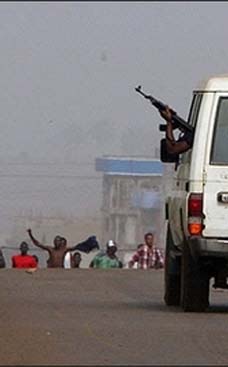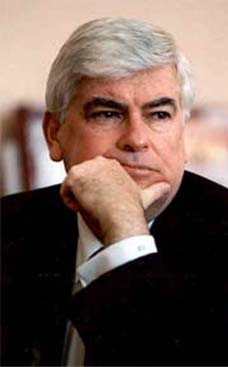
Beijing's actions have now weakened the case for restraint in Washington. The recent test could reinvigorate American advocates for space-based weapons, who have largely kept quiet since the Reagan years. If China follows up with more tests, the American space hawks will grow in strength and numbers and could find new allies in Congress. By launching the weapon, China made a very dangerous gamble that risks worsening the U.S.-China relationship. Given the way the international community criticized Washington a few years ago for acting rashly to overthrow one of the world's worst dictators, it should be consistent now and give Beijing some of the same treatment. China's behavior represents a sort of great-power old-think that the world can no longer afford. Michael O'Hanlon, a Senior Fellow at the Brookings Institute and a Visiting Lecturer at Princeton University, served as a Peace Corps Volunteer in Congo Kinshasa.
Michael O'Hanlon writes: China's new antisatellite program could turn out to be a dangerous mistake
An Intelligent Test?
China's new antisatellite program makes sense—at least from Beijing's perspective. But it could turn out to be a dangerous mistake.
By Michael O'Hanlon
Newsweek International
Caption: Graphic illustrating China's anti-satellite capabilities after Beijing admitted carrying out a satellite destruction test. The United States has said it is reevaluating possible space cooperation with China, including joint moon exploration, following Beijing's recent anti-satellite weapon test.(AFP)
Feb. 5, 2007 issue - On one level, China's recent test of a new antisatellite weapon was a success: Beijing managed to blast one of its aging weather sensors out of orbit several hundred miles above Earth. On a more profound level, however, the test was a mistake. And if China now continues to develop more space weapons, it could turn into a very serious error indeed.
Story continues below ↓ advertisement
Before saying why, however, it's worth pausing to recognize that while China's move was misguided, it was also understandable—especially given the United States' own record in space. First of all, China is now a rising power, and determined to play that role to the hilt. The U.S. Defense Department estimates that China already boasts the world's second largest defense expenditures, once adjustments are made for its lower costs and for off-budget military items. After centuries of subjugation at the hands of the West, it is only natural that the Middle Kingdom would seek its rightful place in the sun. Forty years ago this meant developing its own nukes. Today it means building an antisatellite weapon (which, we should remember, is a lot less dangerous than an atom bomb).
Second, the United States is hardly in a position to complain. For decades, Washington has resisted proposals by China and other countries to ban or limit the development of space weapons. Along with the Soviet Union, it tested its own antisatellite capability during the 1980s, and it continues to develop missile defense systems that could be modified fairly easily for use in space; indeed, spending on such projects continued through the Clinton years and has risen under George W. Bush. These systems, which include already deployed (albeit imperfect) launchers in California and Alaska and an airborne laser still under development, are built to knock down ballistic missiles, which travel at about 4.4 miles per second and spend around 15 minutes several hundred miles above Earth. Low-orbiting satellites move at about the same altitude, and only a little faster, along predictable trajectories. If one can shoot down missiles in space—hitting satellites would not be much harder.
It is also important to recognize that the United States already uses many of its satellites for war fighting. The U.S. military now regularly relies on real-time reconnaissance networks that can spot targets from orbit. It also uses satellites to pass information from sensors to shooters, and uses space-based Global Positioning Systems to guide bombs to their targets. It would therefore be dishonest for Washington to argue that space remains a pristine, war-free zone. The heavens may not have been weaponized yet, but they certainly have been militarized—and by a country that would likely come to the defense of China's archrival, Taiwan, in the event of conflict over that disputed island.
Take all this into account and China's recent test starts to look like the natural action of a rising military power that is keeping a wary eye on U.S. military capabilities as it builds its own. Beijing's latest move may have been more clumsy and aggressive than America's ongoing efforts in space. But—forgive the pun—it hardly took place in a vacuum.
All that said, the test was still a strategic miscalculation by China. Leaving aside the question of who started it, Beijing's latest action risks creating a dynamic that could leave all countries, including China, less secure.
Some pundits have argued that the test was meant merely to pressure the United States into finally agreeing to a treaty to limit space weapons. But this argument doesn't hold water. For one thing, by obliterating one of its old orbiting weather sensors, China also managed to destroy an informal two-decade-old moratorium on such tests. This would be a strange way to promote arms control, as would recent Chinese moves to develop lasers that could disable American satellites.
China also must know that any ban on weapons in space would be unverifiable. This is especially true given the recent proliferation of microsatellites. Weighing 100 kilograms or less, these hard-to-detect devices are often deployed for experimental purposes but could be fairly easily and surreptitiously modified to carry explosives—turning them into orbiting bombs that could take out larger satellites. America's ballistic missile defense programs further compound the verification problem, since they could quickly be converted for use against satellites. If there is one type of arms control that makes sense, it is a ban on the kind of test that China just conducted, since it filled the sky with dangerous debris that will remain in orbit for decades and could damage other satellites. If Beijing was hoping to prevent such actions, it chose a counterintuitive way to go about it.
Story continues below ↓ advertisement
So how should Washington respond? It should for now resist the temptation to start developing, testing and deploying antisatellite capabilities of its own. While China's new weapon does jeopardize low-altitude U.S. reconnaissance sensors, it poses no risk to America's targeting and communications systems, which fly at a much higher orbit. If Washington really wants to protect its space assets, the best way to do that would be by giving them relatively simple defensive measures, and by building redundant systems—not by developing new weapons as a deterrent.
Indeed, racing to build such deterrents would be counterproductive. It would only accelerate the arms race in space—which would hurt the United States far more than any other state, since it already relies on space-based military systems much more heavily than everyone else. Such a move could also reinforce the international image of Washington as dangerously unilateralist and impervious to the will of other countries (a huge majority of which favor a ban on space weapons). And it would increase tensions between the United States and China.
Unfortunately, Beijing's actions have now weakened the case for restraint in Washington. The recent test could reinvigorate American advocates for space-based weapons, who have largely kept quiet since the Reagan years. If China follows up with more tests, the American space hawks will grow in strength and numbers and could find new allies in Congress.
The ball therefore largely remains in Beijing's court. By shooting down an old satellite, China may have done nothing worse than emerging great powers typically do in such situations. Nor was its move particularly belligerent; indeed, China's mistake was simply to allow bureaucratic forces within its government that favor military competition and confrontation to carry the day. If it avoids such moves in the future, the danger could be limited fairly quickly.
But let's be clear: by launching the weapon, China made a very dangerous gamble that risks worsening the U.S.-China relationship. Given the way the international community criticized Washington a few years ago for acting rashly to overthrow one of the world's worst dictators, it should be consistent now and give Beijing some of the same treatment. China's behavior represents a sort of great-power old-think that the world can no longer afford.
O'Hanlon is a Senior Fellow at the Brookings Institution and coauthor of "Hard Power: The New Politics of National Security."
© 2007 Newsweek, Inc.


















